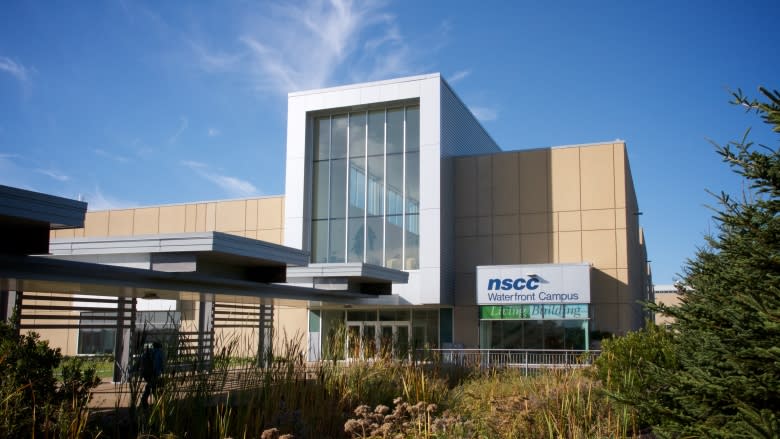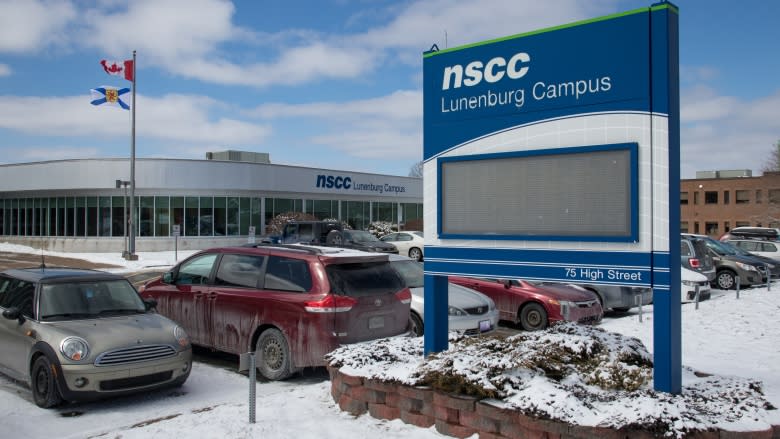Two-year wait greets some community college applicants
Katrina Pierce didn't know a carburetor from a crankshaft the day she helped diagnose a friend's car troubles a few years ago.
Her friend had the hood of his car open and was trying to figure out what was wrong.
"I didn't know the name of anything in there," said Pierce.
She took a peek and instantly saw the problem.
"'Oh, yeah, it's this thing, because this connects to this and this is why it's not working,'" she told him.
"And he looked at me and he's like, 'Well, how did you know that?' I'm like, 'How do you not? You just look at it and you can take it apart in your mind, can't you?' And he's like, 'No.'"
Pierce figured she had a natural aptitude for mechanics, and decided to pursue a career in the field by applying to the Nova Scotia Community College's heavy-duty equipment/truck and transport repair program.
But there was a hitch in her plan. She got put on a wait-list — a long one.
Three years would pass before she finally got to walk in the doors of the college as a student.
Long wait-lists
Pierce's program is one of several at the Nova Scotia Community College with a long wait-list. New applicants to the two-year diploma program at the Akerley campus in Dartmouth may wait until fall 2020 to start classes.
Of the college's 300 program offerings at its campuses throughout the province, 14 have multi-year wait-lists. As of Aug. 15, the number of applications and available spots for the most popular programs are:
- Electrical construction and industrial: 1,185 applications for 200 spots.
- Heavy-duty equipment/truck and transport: 726 applications for 90 spots.
- Licensed practical nursing: 3,636 applications for 272 spots.
- Medical laboratory technology: 423 applications for 39 spots.
- Social services: 420 applications for 30 spots.
Christine Arsenault, NSCC's registrar and director of enrolment, said although some programs do have "really heavy wait-lists," about 66 per cent of the college's offerings across the province are still open for this fall. However, that percentage will decrease as classes get underway this September.
"Wait-lists are really dynamic," Arsenault said. "They change on a daily basis. And they're different year over year. It depends on what's going on in the job market."
Arsenault said some programs are perennially popular, like nursing and medical laboratory technology, while others spike and then level out, such as the shipbuilding trades.
Programs at the Halifax and Dartmouth campuses also tend to have higher demand, so sometimes students attend a rural campus if they can't get into the program they want at an urban campus.
Overall, the college's enrolment is stable and the wait-list numbers are similar compared with last year's, Arsenault said.
Wait-lists have benefits
Would-be students may be impatient to start, but the wait-lists help protect their interests, Arsenault said.
"If we were to offer everybody who applied to a program a seat in that program, at graduation, there may not be employment opportunities for all of those graduates," she said.
Greg Ells, the executive director of higher education for the provincial Department of Labour and Advanced Education, said while the community college tries to match supply and demand, and therefore limits enrolment, it's hard for universities to define the labour market demand for some of their graduates, so admission to some programs is unlimited.
"For example, what would be the careers that someone with a bachelor of arts could pursue? It's almost limitless. So it's not practical to try to assess the labour market opportunities for someone with such a general degree," he said.
For Pierce, limited enrolment means her class sizes are smaller than, say, the average Psychology 101 course, which could have hundreds of students.
"I'm going into a classroom with maybe 23 people max," she said. "So we're getting that concentrated amount of teacher-student interaction."
'It gave me that much more drive'
Pierce said she was a bit frustrated by having to wait to start school at first. "When I first signed up, I wanted to get in there and get it done and over with," she said.
But over time, she realized the wait had its benefits, allowing her to save money for tuition, learn more about the field and ensure that she had made the right decision.
"I don't think that I would be where I'm at academically if it wasn't for that wait because it gave me that much more drive to be successful in what I chose to do," she said.
Now that she's got a year in the program under her tool belt, Pierce said she's "over the moon."
"I absolutely adore the program," she said. "I couldn't be happier. I wake up excited every day about what I could learn and what I can do and what challenges I'm going to face. So it just makes me really excited about my future."
Read more articles from CBC Nova Scotia



